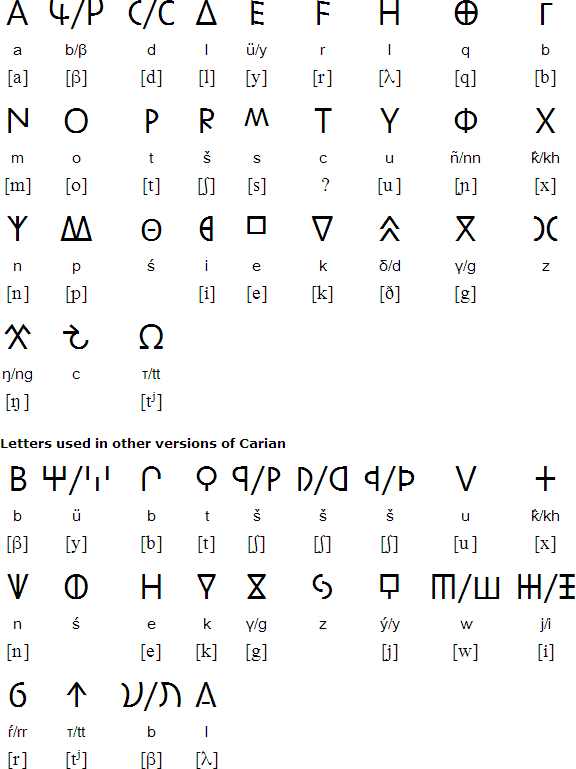The Carian language was an Anatolian language spoken in the southwest of Anatolian (modern Turkey) up to about the 1st Century AD. It was probably a descendant of the Luwian language and was closely related to Lydian.
The Carian alphabet appears in a about 100 pieces of graffiti inscriptions left by Carian mercenaries who served in Egypt. A number of clay tablets, coins and monumental inscriptions have also been found. It was possibly derived from the Phoenician alphabet. The decipherment of the Carian alphabet was started in the 1960s by Vitaly Shevoroshkin, and was continued by Ignacio J. Adiego and Diether Schuerr in the 1990s. The pronunciation of some of the letters remains a mystery.
This chart shows the Carian alphabet from Kaunos, which is the most complete version. Kaunos was a Carian city near what is now Dalyan is Muğla Province is the south west of Turkey. It was known as Kbid in Carian, Khbide in Lycian, Καῦνος in Ancient Greek, and Caunus in Latin.

Download a Carian alphabet chart (Excel)
Information about Carian
http://en.wikipedia.org/wiki/Carian_language
http://en.wikipedia.org/wiki/Carian_script
http://www.linguasport.com/languages/alphabets/Carian.htm
http://www.palaeolexicon.com/Carian
http://scriptsource.org/cms/scripts/page.php?item_id=script_detail&key=Cari
Information about the Caria region and the Carian people
http://www.livius.org/cao-caz/caria/caria.html
http://www.allaboutturkey.com/karya.htm
https://en.wikipedia.org/wiki/Kaunos
Carian, Hittite, Lycian, Lydian
A-chik Tokbirim, Adinkra, ADLaM, Armenian, Avestan, Avoiuli, Bactrian, Bassa (Vah), Beitha Kukju, Beria (Zaghawa), Borama / Gadabuursi, Carian, Carpathian Basin Rovas, Chinuk pipa, Chisoi, Coorgi-Cox, Coptic, Cyrillic, Dalecarlian runes, Elbasan, Etruscan, Faliscan, Fox, Galik, Georgian (Asomtavruli), Georgian (Nuskhuri), Georgian (Mkhedruli), Glagolitic, Global Alphabet, Gothic, Greek, Hurûf-ı munfasıla, Irish (Uncial), Kaddare, Kayah Li, Khatt-i-Badíʼ, Khazarian Rovas, Koch, Korean, Latin, Lepontic, Luo Lakeside Script, Lycian, Lydian, Manchu, Mandaic, Mandombe, Marsiliana, Medefaidrin, Messapic, Mongolian, Mro, Mundari Bani, Nag Chiki, Naasioi Otomaung, N'Ko, North Picene, Novo Tupi, Nyiakeng Puachue Hmong, Odùduwà, Ogham, Old Church Slavonic, Oirat Clear Script, Ol Chiki (Ol Cemet' / Santali), Old Italic, Old Nubian, Old Permic, Ol Onal, Orkhon, Osage, Oscan, Osmanya (Somali), Pau Cin Hau, Phrygian, Pollard script, Runic, Székely-Hungarian Rovás (Hungarian Runes), South Picene, Sutton SignWriting, Sunuwar, Tai Viet, Tangsa, Todhri, Toto, Umbrian, (Old) Uyghur, Wancho, Yezidi, Zoulai
Page last modified: 15.03.23
[top]
You can support this site by Buying Me A Coffee, and if you like what you see on this page, you can use the buttons below to share it with people you know.

If you like this site and find it useful, you can support it by making a donation via PayPal or Patreon, or by contributing in other ways. Omniglot is how I make my living.
Note: all links on this site to Amazon.com, Amazon.co.uk
and Amazon.fr
are affiliate links. This means I earn a commission if you click on any of them and buy something. So by clicking on these links you can help to support this site.
[top]